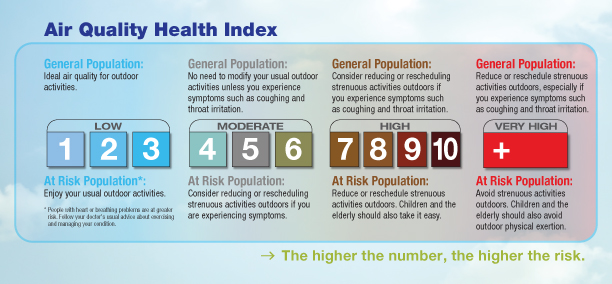Summer is a time for sunshine, swimming, and smoothies (yum!). But as we are all having fun in the summer sun, it’s important to know that the heat can mix with air pollutants to create harmful smog. How harmful can smog be? Consider this - in London, England there was the Great Smog of 1952. Weather conditions trapped pollution close to the ground for five days, and caused an estimated 12,000 deaths. So while we often think of smog as harmless, there can be serious health effects.
Smog is a mixture of air pollutants from car emissions, industrial processes and forest fires that are particularly hazardous on hot and humid days.
How do we know when to protect ourselves against smog?

By checking the Air Quality Health Index (AQHI), which is reported every day by Environment Canada. The AQHI is a number from 1 to 10. The higher the number, the greater the health risk. The AQHI is a good indicator of the health effects of local air pollution, but it’s important to know that it doesn’t measure the effects of odour, pollen, dust, heat or humidity.
When the forecast is expected to have a high AQHI, a smog alert will be issued. In these situations, it is important for children, seniors, people who work or exercise outdoors, and people with diabetes, heart or lung disease to be extra cautious.
Here are three easy steps to protect yourself:
- Check the AQHI in your community.
- Limit strenuous outdoor activities, when the AQHI is high.
- Avoid exercising near areas of heavy traffic.

Since vehicle emissions contribute to air pollution, people who live close to major roads or highways are more likely to suffer from the health effects of smog. Within Wellington-Dufferin-Guelph, approximately 18% of the population lives close to a major road or highway. Even people who commute to work in their cars are not protected, and will be exposed to more air pollution.
Smog will make it harder to breathe; it will irritate your lungs and airways; and it will worsen chronic diseases such as heart disease, chronic bronchitis, emphysema and asthma. Since air pollution can be harmful to your health, even when a smog alert isn’t issued, it is important to watch out for the following signs:
- Breathing difficulties
- Chest tightness
- Cough or throat irritation
- Eye irritation
- Light-headedness
- Wheezing
If you have breathing problems, contact your healthcare professional for advice on how to cope with the health effects of air pollution.
Enjoy the beautiful summer weather, but remember to limit outdoor activities when there is a smog alert.
Sign up for weather alerts at Environment Canada, and follow us on Twitter!
